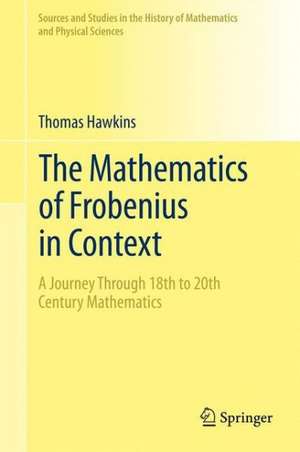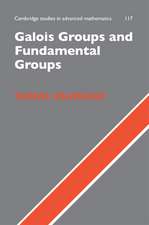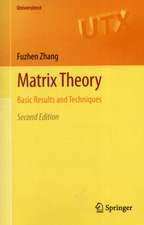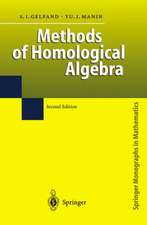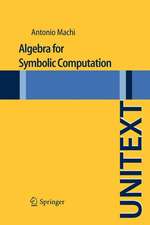The Mathematics of Frobenius in Context: A Journey Through 18th to 20th Century Mathematics: Sources and Studies in the History of Mathematics and Physical Sciences
Autor Thomas Hawkinsen Limba Engleză Hardback – 23 iul 2013
| Toate formatele și edițiile | Preț | Express |
|---|---|---|
| Paperback (1) | 909.77 lei 6-8 săpt. | |
| Springer – 6 aug 2015 | 909.77 lei 6-8 săpt. | |
| Hardback (1) | 916.25 lei 6-8 săpt. | |
| Springer – 23 iul 2013 | 916.25 lei 6-8 săpt. |
Din seria Sources and Studies in the History of Mathematics and Physical Sciences
- 20%
 Preț: 756.13 lei
Preț: 756.13 lei - 18%
 Preț: 907.11 lei
Preț: 907.11 lei - 15%
 Preț: 667.86 lei
Preț: 667.86 lei - 18%
 Preț: 1434.29 lei
Preț: 1434.29 lei -
 Preț: 387.75 lei
Preț: 387.75 lei - 15%
 Preț: 638.57 lei
Preț: 638.57 lei - 18%
 Preț: 896.70 lei
Preț: 896.70 lei - 15%
 Preț: 643.65 lei
Preț: 643.65 lei - 18%
 Preț: 1124.92 lei
Preț: 1124.92 lei - 18%
 Preț: 963.29 lei
Preț: 963.29 lei - 15%
 Preț: 652.31 lei
Preț: 652.31 lei - 18%
 Preț: 1244.89 lei
Preț: 1244.89 lei - 23%
 Preț: 686.57 lei
Preț: 686.57 lei - 15%
 Preț: 649.71 lei
Preț: 649.71 lei -
 Preț: 390.25 lei
Preț: 390.25 lei - 15%
 Preț: 644.18 lei
Preț: 644.18 lei - 15%
 Preț: 580.17 lei
Preț: 580.17 lei - 18%
 Preț: 1123.35 lei
Preț: 1123.35 lei - 15%
 Preț: 641.03 lei
Preț: 641.03 lei - 15%
 Preț: 581.14 lei
Preț: 581.14 lei - 18%
 Preț: 796.31 lei
Preț: 796.31 lei - 18%
 Preț: 2119.49 lei
Preț: 2119.49 lei - 24%
 Preț: 860.16 lei
Preț: 860.16 lei - 15%
 Preț: 645.14 lei
Preț: 645.14 lei -
 Preț: 384.48 lei
Preț: 384.48 lei - 18%
 Preț: 1410.63 lei
Preț: 1410.63 lei - 18%
 Preț: 969.28 lei
Preț: 969.28 lei - 15%
 Preț: 642.03 lei
Preț: 642.03 lei - 18%
 Preț: 1113.71 lei
Preț: 1113.71 lei - 15%
 Preț: 662.16 lei
Preț: 662.16 lei - 18%
 Preț: 963.29 lei
Preț: 963.29 lei - 15%
 Preț: 647.59 lei
Preț: 647.59 lei -
 Preț: 395.63 lei
Preț: 395.63 lei - 18%
 Preț: 941.50 lei
Preț: 941.50 lei - 15%
 Preț: 709.56 lei
Preț: 709.56 lei - 18%
 Preț: 901.26 lei
Preț: 901.26 lei - 15%
 Preț: 695.53 lei
Preț: 695.53 lei - 24%
 Preț: 1294.90 lei
Preț: 1294.90 lei
Preț: 916.25 lei
Preț vechi: 1117.38 lei
-18% Nou
Puncte Express: 1374
Preț estimativ în valută:
175.32€ • 183.54$ • 145.07£
175.32€ • 183.54$ • 145.07£
Carte tipărită la comandă
Livrare economică 05-19 aprilie
Preluare comenzi: 021 569.72.76
Specificații
ISBN-13: 9781461463320
ISBN-10: 1461463327
Pagini: 686
Ilustrații: XIII, 699 p.
Dimensiuni: 155 x 235 x 45 mm
Greutate: 1.17 kg
Ediția:2013
Editura: Springer
Colecția Springer
Seria Sources and Studies in the History of Mathematics and Physical Sciences
Locul publicării:New York, NY, United States
ISBN-10: 1461463327
Pagini: 686
Ilustrații: XIII, 699 p.
Dimensiuni: 155 x 235 x 45 mm
Greutate: 1.17 kg
Ediția:2013
Editura: Springer
Colecția Springer
Seria Sources and Studies in the History of Mathematics and Physical Sciences
Locul publicării:New York, NY, United States
Public țintă
ResearchCuprins
1. A Berlin Education.- 2. Professor at the Zurich Polytechnic.- 3. Berlin Professor.- 4. The Paradigm.- 5. Further Development of the Paradigm.- 6. The Problem of Pfaff.- 7. The Cayley-Hermite Problem and Matrix Algebra.- 8. Arithmetical Investigations: Linear Algebra.- 9. Arithmetical Investigations: Groups.- 10. Abelian Functions.- 11. Frobenius' Generalized Theory of Theta Functions.- 12. The Group Determinant Problem.- 13. Group Characters and Representations.- 14. Alternate Routes to Representation Theory.- 15. Characters and Representations after 1897.- 16. Loose Ends.- 17. Nonnegative Matrices.- 18. The Mathematics of Frobenius in Retrospect.- References.- Index.
Recenzii
From the book reviews:
“I highly recommend Hawkins’ book. It is very mathematical all the way through. … Hawkins’ work is extraordinarily useful. It allows the mathematical community, even the great majority of us who do not read German well, to understand the work of the very important mathematician Frobenius. The great length of the book is essential to the book’s success.” (David P. Roberts, MAA Reviews, October, 2014)
“The author has succeeded admirably in describing the mathematical work of Frobenius. … this book is an excellent contribution to the mathematical literature … it is, or should be, a role model for historical writing, and for bringing the mathematics of the recent past back to life.” (Franz Lemmermeyer, zbMATH, Vol. 1281, 2014)
“I highly recommend Hawkins’ book. It is very mathematical all the way through. … Hawkins’ work is extraordinarily useful. It allows the mathematical community, even the great majority of us who do not read German well, to understand the work of the very important mathematician Frobenius. The great length of the book is essential to the book’s success.” (David P. Roberts, MAA Reviews, October, 2014)
“The author has succeeded admirably in describing the mathematical work of Frobenius. … this book is an excellent contribution to the mathematical literature … it is, or should be, a role model for historical writing, and for bringing the mathematics of the recent past back to life.” (Franz Lemmermeyer, zbMATH, Vol. 1281, 2014)
Notă biografică
Thomas Hawkins won the 2001 Whiteman Prize, an AMS prize that honors notable exposition in the history of mathematics. The citation for the prize calls Hawkins "an outstanding historian of mathematics whose current research and numerous publications display the highest standards of mathematical and historical sophistication." The citation also mentions a number of Hawkins’ works, including his book, The Emergence of the Theory of Lie Groups: An Essay in the History of Mathematics 1869-1926. "Hawkins’ work has truly transformed our understanding of how modern mathematics has evolved," the citation concludes.
Textul de pe ultima copertă
Frobenius is best known as creator of the theory of group characters and representations, but his name is attached to a multitude of theorems and concepts from a broad spectrum of mathematical disciplines. In this book his mathematics is presented “in context” in two senses. The first provides the reader with the historical background necessary to understand why Frobenius undertook to solve a particular problem and to appreciate the magnitude of his achievement. Part of the context involves Frobenius’ training in the Berlin school of mathematics presided over by Weierstrass, Kronecker, and Kummer, from whom he learned disciplinary ideals as well as theorems. Frobenius’ mathematics is also presented “in context” in that the author traces the ways in which his work was subsequently applied, developed, and ultimately incorporated into present-day mathematics. As a consequence of the contextual approach, the reader will encounter a broad swath of diverse and important strands of 18th–20th century mathematics, ranging from the work of Lagrange and Laplace on stability of linear systems of differential equations to the theory of complex abelian varieties.
The book is divided into three parts. Part I provides an overview of Frobenius’ entire mathematical career and thus serves as an introduction to the main body of the book. Here, within the framework of his educational and professional career, his contributions to mathematics and the attendant backgrounds are briefly sketched and their subsequent impact upon the development of mathematics indicated. Part II presents the development of core aspects of linear algebra up to and including the work of Weierstrass and Kronecker. The chapters of Part III deal in depth with Frobenius’ major works and can be read independently of one another.
Thomas Hawkins was awarded the MAA Chauvenet Prize for expository writing and was the first recipient of the AMS Whiteman Prize for historicalexposition. His last book was Emergence of the Theory of Lie Groups (Springer, 2000).
The book is divided into three parts. Part I provides an overview of Frobenius’ entire mathematical career and thus serves as an introduction to the main body of the book. Here, within the framework of his educational and professional career, his contributions to mathematics and the attendant backgrounds are briefly sketched and their subsequent impact upon the development of mathematics indicated. Part II presents the development of core aspects of linear algebra up to and including the work of Weierstrass and Kronecker. The chapters of Part III deal in depth with Frobenius’ major works and can be read independently of one another.
Thomas Hawkins was awarded the MAA Chauvenet Prize for expository writing and was the first recipient of the AMS Whiteman Prize for historicalexposition. His last book was Emergence of the Theory of Lie Groups (Springer, 2000).
Caracteristici
Written by an expert in the field with forty years of research on the subject Presented in three parts for optimal accessibility Contains a detailed table of contents to guide readers to the works of greatest interest to them
